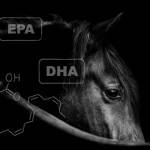Omega-3 Fatty Acid Supplementation May Reduce Oxidative Damage of Cells, Tissues

The benefits of omega-3 fatty acid supplementation in horses are multifold: improved respiratory health, heightened body-wide anti-inflammatory response, and tempered metabolic parameters in horses with endocrine disease, just to name a few. Despite these advantages, researchers evaluated a potential downside to omega-3 supplementation: could omega-3 supplementation increase cell membrane susceptibility to oxidative stress, leading to cell destruction and tissue damage?
“Due to their chemical structure, certain fatty acids, including the polyunsaturated long-chain omega-3 fatty acids eicosapentaenoic acid (EPA) and docosahexaenoic acid (DHA), are predisposed to oxidative damage,” said Catherine Whitehouse, M.S., a nutritionist at Kentucky Equine Research.
To determine the effects of omega-3 supplementation on oxidative damage and antioxidant status in growing horses, researchers at the University of Florida fed 18 Quarter Horse yearlings milled flaxseed, fish oil, or no supplement at all in addition to concentrate and bahiagrass pasture forage. The milled flaxseed and fish oil were fed in amounts to provide 60 mg of omega-3 per kilogram of body weight.*
Blood samples were obtained on day 0 and day 70, and tested for vitamin E and selenium status, markers of lipid peroxidation, antioxidant biomarkers, and oxidative stress.
The researchers concluded that this study “provides no evidence that growing horses endure additional oxidative stress when supplemented with milled flaxseed or fish oil to provide 60 mg omega-3s per kilogram of body weight, assuming dietary vitamin E requirements are met.”
Moreover, and perhaps most importantly, “elevated vitamin E status in horses fed fish oil, coupled with lower serum F2-isoprostanes, further suggest that the longer-chain, highly unsaturated omega-3 fatty acids EPA and DHA may actually attenuate lipid peroxidation,” according to the researchers.
“The findings of this study further bolster the recommendation to provide direct sources of EPA and DHA. Kentucky Equine Research offers horse owners EO-3, a marine-derived oil rich in these fatty acids,” Whitehouse advised.
In the past, some horses would be reluctant to eat marine-derived oils, likely because of the unpleasant odor.
“Kentucky Equine Research performed extensive palatability trials, carrying out over 1,000 two-choice taste tests,” explained Whitehouse. “Rather than using flavoring to mask fishy odors, EO-3 applies advanced processing technology to remove ketones and aldehydes that hasten oxidation, which contribute to fishy odors over time and cause rancidity with exposure to heat.”
Additional vitamin E supplementation will minimize any potential oxidative stress induced by long-chain omega-3 fatty acids and enhance body-wide antioxidant defenses, Whitehouse mentioned. Choose a natural-source vitamin E, such as Nano-E, as it features superior bioavailability.
*White-Springer, S.H., K.R. Vineyard, J. Kivipelto, and L.K. Warren. 2021. Dietary omega-3 fatty acid supplementation does not impair vitamin E status or promote lipid peroxidation in growing horses. Journal of Animal Science 99(7):1-8.








